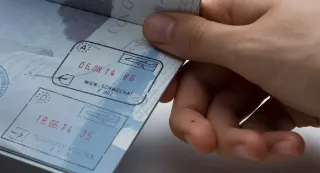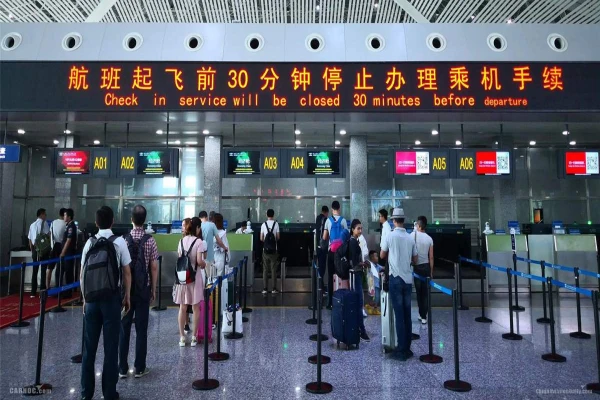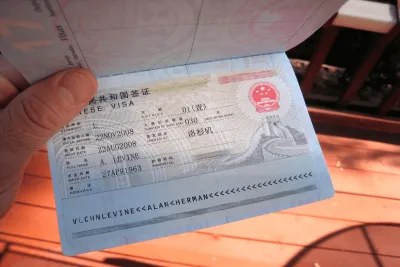Everything to Know About Getting a China Visa
Planning a trip to China? You're in for an incredible journey! From walking the Great Wall to exploring the bustling streets of Shanghai, China offers a fascinating blend of ancient history and modern innovation. If you’re planning a trip to China, start your application via our China visa service page. But before you can experience the wonders of the Middle Kingdom, there's one crucial step you need to tackle: getting your China visa.
Understanding China visa requirements might seem daunting at first – and yes, the process is more involved than for many other countries.
But don't worry! Whether you're dreaming of seeing the Terracotta Warriors, studying Mandarin in Beijing, or closing business deals in Guangzhou.
we'll help you understand exactly what you need to make your Chinese adventure a reality.
Unlike some Asian countries that offer visa-free entry or visa-on-arrival for many nationalities, China generally requires most visitors to obtain a visa before arrival. The China visa application process needs careful attention to detail, but it's absolutely manageable when you know what to expect.
So, do you need a visa to go to China? Generally, you'll need a visa for China if you're:
- Planning to visit mainland China for any length of time
- Traveling for tourism, business, study, or work
- Transit staying beyond the visa-free transit policy limits
- Planning to visit areas outside of designated visa-free zones
The good news is that China's visa system, while strict, is well-organized and consistent. Once you understand the basic requirements and have all your documents in order, the process typically moves smoothly. Chinese authorities have also modernized their system in recent years, making the application process more straightforward than it used to be.
Throughout this guide, we'll walk you through everything you need to know about securing your Chinese visa – from choosing the right visa type to gathering your documents and submitting a successful application. We'll also cover recent changes in visa policies and special considerations that might affect your application.
For travelers looking to visit China temporarily without a visa, check out our detailed guide on China Visa-Free Transit & Entry Policies to see if you qualify for short-term stays.
Let's explore each type of China visa to help you understand exactly which one matches your needs. China's visa system uses different letters to represent specific purposes of visit, and knowing the distinctions between them is crucial for a successful application.
Tourist Visa (L Visa)
The China tourist visa, commonly known as the L visa, is the most frequently requested type of Chinese visa. It's designed for people traveling to China for sightseeing, leisure, or visiting friends (without family relations).
This visa typically offers validity periods of 30, 60, or 90 days, and you can apply for single, double, or multiple entries depending on your travel plans. You'll need to provide your round-trip ticket booking, hotel reservations, and a detailed itinerary to support your application.
Business Visa (M Visa)
The M visa caters to those engaging in commercial and trade activities in China. It's perfect if you're planning to attend business meetings, trade fairs, or conduct factory inspections. The validity of a China business visa typically ranges from 30 to 90 days and can be extended if necessary.
One crucial requirement is an invitation letter from a Chinese company, along with supporting documentation about your business activities. The M visa allows for multiple entries in many cases, making it convenient for regular business travelers.
Student Visa (X Visa)
Student visas come in two distinct categories. The X1 visa serves long-term students enrolled in programs lasting more than 180 days. It requires an admission letter from a Chinese educational institution and additional documentation like the JW201 or JW202 form.
For shorter study programs under 180 days, the X2 visa offers a streamlined application process with fewer requirements. Both types require proof of enrollment and financial capability to support your studies.
The Z visa is mandatory for anyone planning to work legally in China. It requires substantial documentation, including an employment license, invitation letter from your employer, and work permit notification letter.
Initially valid for 30 days, you'll need to convert it to a residence permit after arriving in China. The application process includes proving your professional qualifications and meeting specific salary requirements set by local authorities.
Family Visa (Q Visa)
Family visas are split into two types based on the length of stay. The Q1 visa suits those planning extended family reunions lasting over 180 days.
You'll need to provide documentation proving your relationship with Chinese family members. For shorter family visits under 180 days, the Q2 visa offers a more straightforward process but still requires proper invitation letters and relationship proof.
Special Visa Types
China also offers specialized visas for specific purposes:
· The F visa caters to non-commercial exchanges in scientific, educational, or cultural fields.
· The prestigious R visa is reserved for high-level talents and senior professionals with specialized skills needed in China.
Each of these types of China visa comes with its own specific requirements and application processes.
Important Considerations
Processing times vary based on service level, ranging from standard 4-day processing to rush service in one day for additional fees. Visa validity periods can range from 30 days to 10 years, largely depending on your nationality and bilateral agreements between China and your home country. The actual stay duration permitted for each entry might differ from the overall visa validity, typically ranging from 30 to 90 days per entry.
Remember that your chosen visa type must accurately reflect your activities in China. Engaging in activities not permitted by your visa (such as working on a tourist visa) can result in serious consequences, including fines, deportation, and future travel restrictions. Always ensure you're applying for the appropriate visa type by carefully considering your main purpose for visiting China, intended length of stay, and whether you'll need multiple entries.
When in doubt about which visa type best suits your needs, it's advisable to consult with the Chinese embassy or a reputable visa service like VisaTitans. Requirements can change frequently, and staying informed about current regulations will help ensure a smooth application process.
If you're unsure which visa suits your trip, our in-depth guide on China Visa Categories breaks down each visa type, from tourist, Visa on arrival to work visas, helping you choose the right one.
Regulations & Special Cases
Many travelers worry about visa denials, which can disrupt travel plans. Understanding Common Reasons for China Visa Denial can help you avoid costly mistakes such as incomplete applications, insufficient documentation, or failure to meet financial requirements. In some cases, applicants unknowingly overstay their visas, leading to legal consequences. Our Guide to Overstaying a China Visa explains the penalties, fines, and steps to rectify overstays.
If your stay in China needs to be extended, there are specific procedures you must follow. Our China Visa Renewal & Extension Guide outlines the process, requirements, and timelines to apply for an extension. Additionally, travelers looking to convert a tourist visa into a work visa must understand the complexities involved. Read our Changing from a Tourist Visa to a Work Visa in China guide to learn about employer sponsorship, government approvals, and legal work permits.
Parents traveling with minors should be aware of special visa conditions. Our China Visa Rules for Minors explain guardianship requirements, travel authorization letters, and necessary supporting documents for children traveling alone. For those seeking medical treatment in China, a China Medical Visa Guide provides essential information on visa applications, required hospital approvals, and necessary documentation.
For long-term residents, understanding the difference between visas and residence permits is key. Our China Residence Permit vs. Visa Comparison clarifies the legal distinctions and eligibility criteria for obtaining long-term residency in China.
China Visa Requirements by Nationality: What You Need to Know
Let's break down everything you need to know on how to get a China visa, based on where you're from. While China's visa system might seem complex at first, understanding the requirements for your specific nationality will make the process much clearer.
For American travelers, the China visa for US citizens process comes with some unique advantages. Thanks to a reciprocal agreement between China and the United States, Americans typically receive the China 10-year visa, allowing multiple entries during this time. This sounds amazing – and it is! – but there's an important catch: while your visa remains valid for 10 years, each visit is usually limited to 60 or 90 days. To apply for China visa from the US, you'll need to provide a valid passport with at least six months remaining before expiration, recent photos meeting specific China visa photo requirements, and proof of your travel plans including round-trip flights and hotel bookings.
Things work quite differently for Hong Kong and Macau. These Special Administrative Regions operate under their own rules, much more relaxed than mainland China. Most international visitors, including Americans, can enter Hong Kong for up to 90 days and Macau for up to 30 days without any visa at all. However – and this is crucial – this doesn't include mainland China. If you're planning to cross from Hong Kong or Macau into mainland China, you'll still need a proper Chinese visa, even for a day trip to nearby Shenzhen or Guangzhou.
One of the most interesting options for international travelers is China's visa-free transit policy. If you're just passing through, you might be able to explore various sites without getting a China transit visa at all. The China visa-free transit program allows citizens from 53 countries to spend up to 72 hours in major cities like Beijing and Shanghai without a visa. Some cities even offer 144-hour stays! However, there are strict rules: you must be traveling to a third country (not returning to where you came from), have confirmed tickets for your onward journey, and stay within the approved transit zone.
Different rules apply for business travelers, regardless of nationality. Along with standard documentation, you'll need an invitation letter from a Chinese company. This letter must include specific details about your planned business activities in China, and the inviting company needs proper registration with Chinese authorities. The letter isn't just a formality – Chinese officials take it seriously as proof of your business intentions.
Special situations can create exceptions to these rules. For instance, some cities occasionally offer unique visa policies during major international events or trade fairs. The tropical island province of Hainan allows tourists from certain countries to visit visa-free for up to 30 days if they're traveling with an approved tour group. Additionally, diplomatic and official passport holders often follow different rules entirely.
Remember that visa requirements can change quickly, sometimes in response to international events or public health situations. The COVID-19 pandemic showed just how rapidly these policies can shift. Always check the most current requirements through official channels, like the Chinese embassy in your country, to know the China visa mistakes to avoid when finalizing your travel plans.
Having a valid visa doesn't guarantee entry into China – the final decision always rests with immigration officers at your point of entry. The best way to ensure a smooth arrival is to have all your documentation well-organized and make sure your planned activities exactly match what your visa allows. Being prepared and honest about your travel plans goes a long way in making your entry into China as smooth as possible. Ensure you meet all China visa requirements before applying.
If you prefer personalized guidance or find the online application process intimidating, consider a reputable visa agency like VisaTitans.
Agencies offer valuable expertise in navigating the complexities of the China visa system.
They ensure your application is complete and accurate, track your visa status, and often have established relationships with consular offices that can help streamline the process. Visa agencies typically charge a service fee in addition to the official visa cost.























































